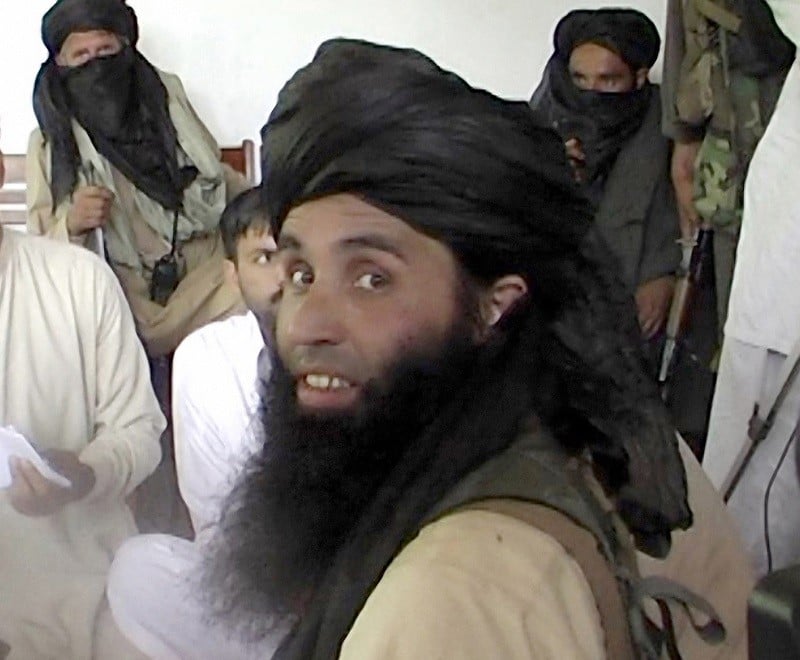
The rise of Fazlullah from chairlift operator to designated global terrorist

Once upon a time Fazlullah earned his livelihood operating a rudimentary chairlift to ferry villagers back and forth across the river Swat from his village, Mamdheray, to Fizzaghat in Mingora.
Times changed and during the period 2007-2009 he became the de facto ruler of most parts of the heavenly Swat valley. As the ameer of the Swat Taliban, his word became law as he ran private jails and presided over Shariat courts.
However, he and his band of militants were driven from Swat and rest of Malakand division when the Pakistan military launched a massive operation in May 2009 to stop them from further expanding their hold over the region. They escaped to neighbouring Afghanistan and got refuge in the eastern provinces of Kunar, Nuristan and Nangarhar.
Though Fazlullah had risen in the ranks and become the head of the outlawed militant group Tehrik-i-Taliban Pakistan (TTP) after the assassination of Hakimullah Mehsud in a US drone strike in North Waziristan in November 2013, his woes had increased due to displacement, an uncertain life in an alien country and constant security concerns. The TTP had split and weakened after losing territory and fighters and the public opinion in Pakistan had decisively turned against him.
By 2011, Fazlullah had become strong enough in Afghanistan to use his bases near the border with Pakistan to launch a series of lethal cross-border attacks in the Chitral, Lower Dir and Upper Dir districts and Bajaur and Mohmand tribal regions.
Pakistan had to reinforce its border with fortifications and troops to prevent the attacks, but Fazlullah’s men continued to sneak across the Durand Line to undertake occasional attacks with help from facilitators against the security and law enforcement agencies and the anti-Taliban peace committees.
Finally on June 14, 2018, Fazlullah was killed along with his four men in a number of US drone strikes in Marawara district of Afghanistan’s Kunar district bordering Bajaur and Dir. Two months earlier, his young son Abdullah (real name Abdul Basit) too had been killed in a drone attack in Kunar.
It was hard to believe Fazlullah is no more as claims about his death had previously been made in 2009 and 2015. Government functionaries had also announced he was injured in military action in Swat and was under siege and about to be captured.
Born in 1974 as Fazal Hayat, his name was changed to Fazlullah and so did his fortunes. He studied at the madrassa of Maulana Sufi Mohammad, the founder of the Tanzim Nifaz-i-Shariat-i-Mohammadi (TNSM) that campaigned for enforcement of Shariah in Malakand division in Maidan area of Lower Dir and ended up marrying his daughter. This was the start of his career as a militant as he joined the TNSM and accompanied Sufi Mohammad when he took several thousand Pakistanis in November 2001 to Afghanistan to fight on the side of the Afghan Taliban against the invading army of the US and its Afghan allies from the Northern Alliance.
Following the collapse of the Taliban regime in December 2001, Sufi Mohammad, Fazlullah and the surviving members of their lashkar returned to Pakistan, got arrested and were jailed in the Dera Ismail Khan prison. While the elderly Sufi Mohammad refused to apply for bail in the courts that he considered ‘un-Islamic’ because these worked under British laws, Fazlullah got bailed out after 17 months imprisonment and returned to Swat to begin reorganising and taking over TNSM leadership. By the time Sufi Mohammad was released in 2008 to help the government to restore peace in Malakand region, Fazlullah was in effective control of the radicalised TNSM and had made it part of the TTP founded by Baitullah Mehsud in December 2007.
Fazlullah had earned fame and followers by using an illegal FM channel since 2006 to broadcast his religious speeches and anti-Western messages. Soon he came to be known as Radio Mullah. He spoke against music, dance, television and certain social vices and asked the people to grow beards and observe purdah. He opposed polio vaccination as he alleged it was being used by anti-Islam Westerners for spying.
The 2007 siege of the Lal Masjid was a turning point in Fazlullah’s militant career. Subsequently in 2012, his group claimed responsibility for the failed life attempt on schoolgirl Malala Yousafzai and the attack in September 2013 that claimed the life of Maj Gen Sanaullah Niazi in Dir.
In December 2014, the TTP under his command claimed it had carried out the terrorist attack on the Army Public School in Peshawar in which 147 persons, including 122 schoolchildren, were martyred. Though Fazlullah was designated global terrorist in April 2015, the US added his name to its most wanted list in March 2018 and announced $5 million as head-money for his capture. This was an indication that the US had finally decided to go after him after having been asked repeatedly by Islamabad to target Afghanistan-based terrorists threatening Pakistan.